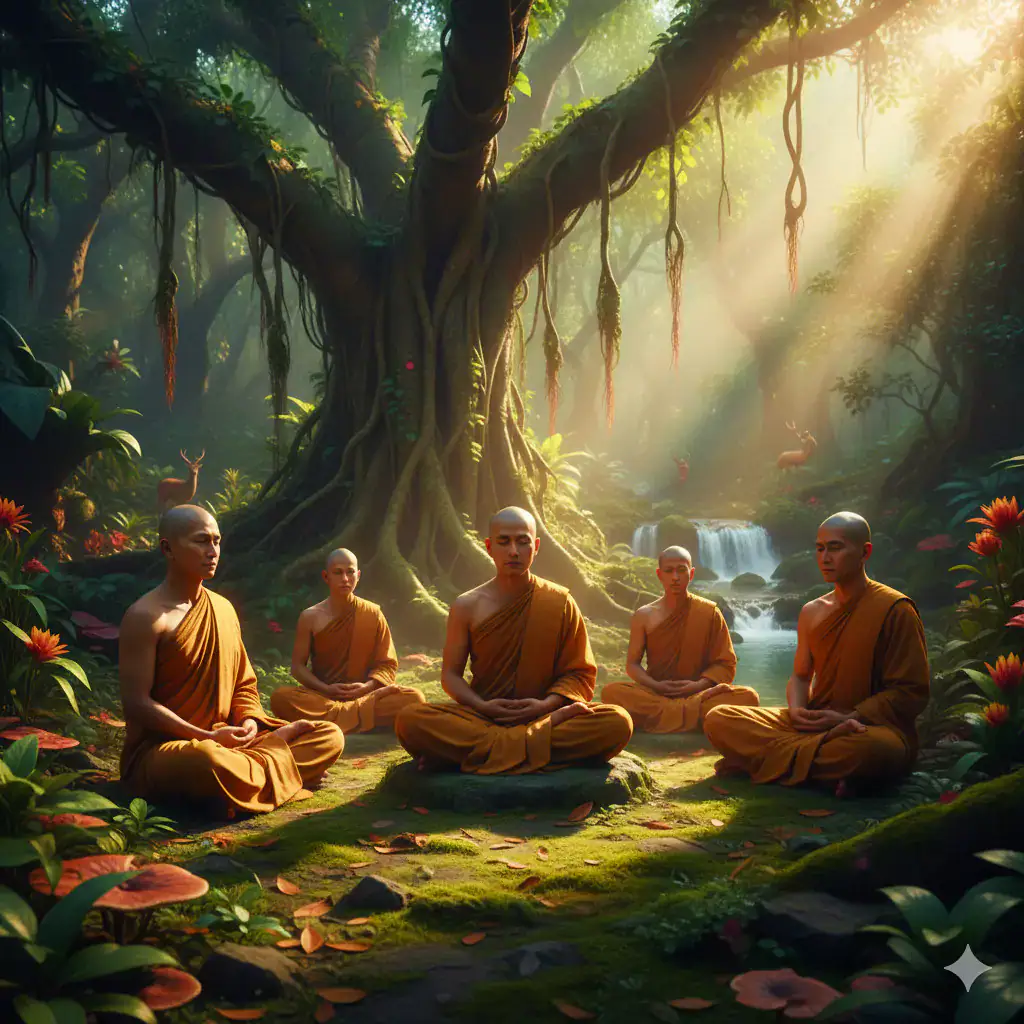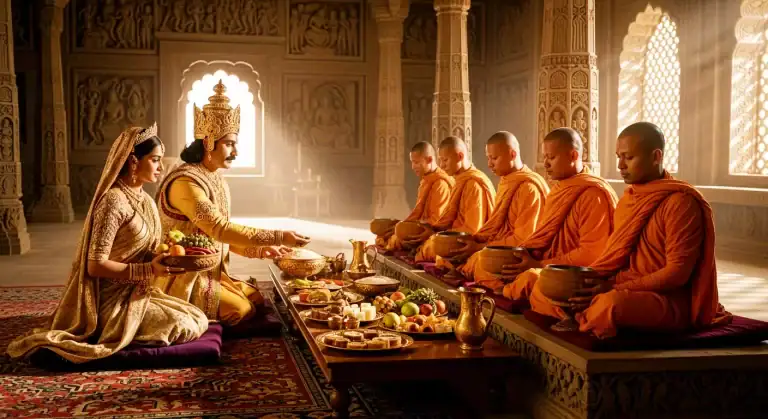PANIYA JĀTAKA
-
Save
This story the Master told while dwelling at Jetavana, about the subduing of evil passions.
At one time, it is said, five hundred citizens of Sāvatthī—being householders and friends of the Tathāgata—heard the Law, renounced the world, and were ordained as monks. Dwelling in the House of the Golden Pavement, they indulged in sinful thoughts at midnight. (All details are to be understood as in a previous story.)
At the command of the Blessed One, the Brotherhood was assembled by the Venerable Ānanda. The Master sat in the appointed seat, and without asking directly, “Do you indulge in sinful thoughts?” he addressed them comprehensively and in general terms:
“Brethren, there is no such thing as a petty sin. A Brother must check every sin as it arises. Wise men of old, even before the Buddha appeared in the world, subdued their sins and attained the knowledge of a Pacceka-Buddha.”
Having spoken thus, he told them a story of the past.

-
Save
Some time afterwards, the five Pacceka-Buddhas all alighted at the gate of Benares, seeking for alms. Their upper robe and lower robe neatly arranged, with gracious address they went on their rounds, and came to the gate of the King’s palace. The King was much pleased to behold them; he invited them into his palace, and washed their feet, anointed them with fragrant oil, set before them savoury food both hard and soft, and sitting on one side, thus addressed them: “Sirs, that you in your youth have embraced the ascetic life, is beautiful; at this age, you have become ascetics, and you see the misery of evil lusts. What was the cause of your action?” They replied as follows:
“The water-draught of my own friend, although a, friend, I stole:
Loathing the sin which I had done, I afterwards was fain
To leave the world, an eremite, lest I should sin again.”“I looked upon another’s wife; lust rose within my soul:
Loathing the sin which I had done, I afterwards was fain
To leave the world, an eremite, lest I should sin again.”“Thieves caught my father in a wood: to whom I did forth tell
That he was other than he was—a lie, I knew it well:
Loathing the sin,” etc.“The people at a drinking-feast full many beasts did kill,
And not against my will:
Loathing the sin,” etc.“Those persons who in former times of liquors drank their fill,
Now carried out a drinking-bout, whence many suffered ill,
And not against my will.
Loathing the sin which I had done, I afterwards was fain
To leave the world, an eremite, lest I should sin again.”
These five stanzas they repeated one after the other.
When the king had heard the explanation of each, he uttered his praise, saying, “Sirs, your asceticism becomes you well.”
The king was delighted at the discourse of these men. He bestowed upon them cloth for outer and inner garments, and medicines, then let the Pacceka-Buddhas go away. They thanked him, and returned to the place whence they came. Ever after that the king loathed the pleasures of sense, was free from desire, ate his choice and dainty food, but to women he would not speak, would not look at them, rose up disgusted at heart and retired to his magnificent chamber, and there he sat: stared at a white wall until he fell into a trance, and conceived within him the rapture of mystic meditation. In this rapture rapt, he recited a stanza in dispraise of desire:
“Out on it, out on lust, I say, unsavoury, thorn-beset!
Never, though long I followed wrong, such joy as this I met!”
Then his chief queen thought to herself, “That king heard the discoursing of the Pacceka-Buddhas, and now he never speaks to us, but buries himself despondent in his magnificent chamber. I must take him in hand.” So she came to the door of that lordly chamber, and standing at the door, heard the king’s rapturous utterances, in dispraise of desire. She said, “O mighty king, you speak ill of desire! but there is no joy like the joy of sweet desire!” Then in praise of desire she repeated another stanza:
“Great is the joy of sweet desire: no greater joy than love:
Who follow this attain the bliss of paradise above!”
Hearing this, the king made reply: “Perish, vile jade! What sayst thou? Whence comes the joy of desire? There are miseries which come to pay for it” : with which he uttered the remaining stanzas in dispraise:
“Ill-tasting, painful is desire, there is no worser woe:
Who follow sin are sure to win the pains of hell below.“Than sword well whetted, or a blade implacable, athirst,
Than knives deep driven in the heart, desires are more accurst.“A pit as deep as men are tall, where live coals blazing are,
A ploughshare heated in the sun,—desires are worser far.“A poison very venomous, an oil of little ease,
Or that vile thing to copper clings —desires are worse than these.”
Thus the Great Being discoursed to his consort. Then he gathered his courtiers, and said, “O courtiers, do you manage the kingdom: I am about to renounce the world.” Amidst the wailing and lamentation of a great multitude, he rose before them, and poised in the air, delivered a discourse. Then along the path of the wind he past to furthest Himalaya, and in a delightsome spot builded a hermitage; there he lived the life of a sage, until at the end of his days he became destined for the world of Brahma.

-
Save
The Master, having ended this discourse, added: “Brethren, there is no such thing as a petty sin; even the very smallest must be checked by the wise.” Then he declared the Truths, and identified the Birth. (Now, at the conclusion of the Truths, the five hundred Brethren became established in sainthood.) He said: “At that time the Pacceka-Buddhas attained Nirvāṇa; Rāhula’s mother was the queen consort; and I myself was the king.”
Source : The Jataka ,Vol 4, by W.H.D. Rouse, 1901
